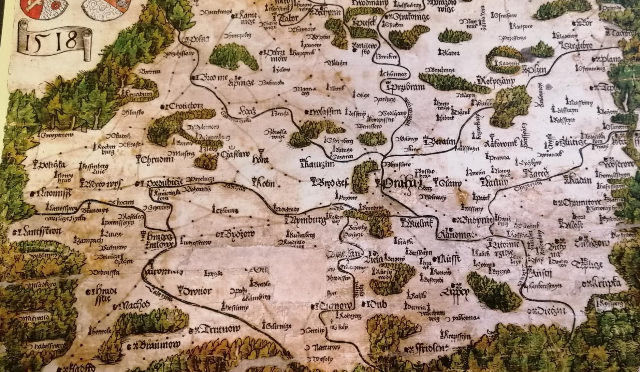
Second session of the CEFRES 2023 Francophone Interdisciplinary Seminar. The map and the border
In 2023, we would like to start by questionning the very act of bordering and representing (a territory, a period, a trajectory), in short, thanks to the interdisciplinarity of our respective disciplines, to question the map and the border.
Location: CEFRES Library, Na Florenci 3, Prague 1
Dates: Friday, May 12th, 10 am – 11.30 am.
Language: french
Eloïse ADDE (CEU), discussant Jan ZDICHYNEC (Charles University)
Territory is one of the fundamental markers defining a nation; it is even an essential support of it, alongside the State and the population to which it is attached. Often corresponding to natural phenomena that can be identified spatially, such as mountain ridges or river lines, the territory is generally taken for granted and is therefore rarely questioned. Nevertheless, like the nation it materialises, it is a construction, a production that is fluid and changing depending on the uses that are made of it, and its display is much more contingent than it seems. Territory is closely linked to political practice; it is what unifies a “political community”, but the latter also gives it its shape. In this communication, Eloïse Adde will decipher the function of territory and the way it was perceived and constructed within two projects aimed at founding and consolidating the nation in Bohemia and Brabant in the early 14th century.
See the complete program of the seminar here.
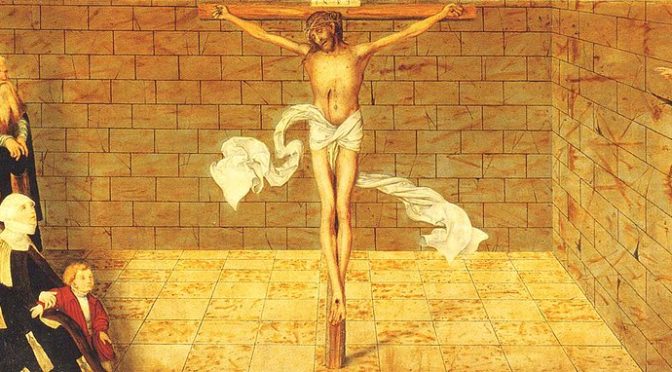
The rhetoric of Good Friday sermons in 14th-century Bohemia: Defining norms, commonplaces, and discrepancies
8th session of CEFRES in-house seminar 2022-2023.
Through the presentation of works in progress, CEFRES’s Seminar aims at raising and discussing issues about methods, approaches or concepts, in a multidisciplinary spirit, allowing everyone to confront her or his own perspectives with the research presented.
Location: CEFRES Library and online
Date: Tuesday 9th of May 2023, 16:30
Language: English
Contact: cefres[@]cefres.cz
Olga Kalashnikova (PhD candidate at CEU / associated with CEFRES)
Discussant: Eloïse Adde (CEU)
Abstract
Holy Week – and Good Friday in particular – represents a crucial period of the Lenten season, as it marks the peak of Christian devotion. During Holy Week, charismatic preachers of the Middle Ages sought to profoundly influence the daily life and religious behavior of the people. Bohemian preachers retold the story of Christ’s Passion to evoke an emotional response from listeners (and sometimes readers) and invite them to repent and confess their sins. In some instances, preachers experimented with available sources and theological and rhetorical approaches to the topic to reflect on the growing devotion to the Passion and sacraments in the region and even criticise moral decay of the Bohemian laity and clergy.
My presentation will focus on intellectual background and shared discourse on Christ’s Passion that surrounded fourteenth-century Bohemian preachers while composing their Good Friday sermons at desk. In addition, I will discuss the rationale, structure, methodology, and goals of my PhD project, which ultimately aims to critically examine Good Friday preaching in Bohemia in 1330-1380, identify the peculiarities (transgressions) – of the Bohemian corpus in the broader European context, and classify some theological, hermeneutical, pastoral, and rhetorical “commonplaces” (norms) typical for the genre.
See the complete program of the seminar here.
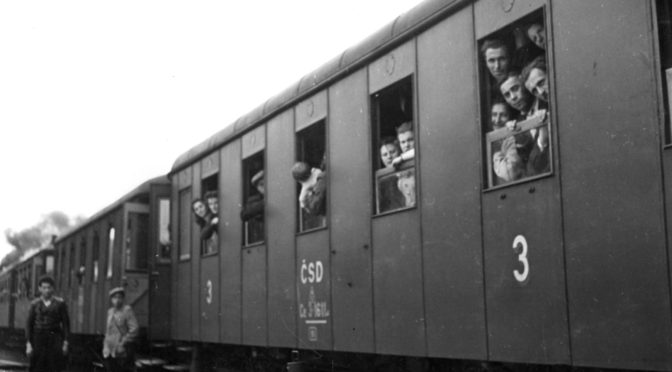
First session of the CEFRES 2023 Francophone Interdisciplinary Seminar. The map and the border
In 2023, we would like to start by beginning by questionning the very act of bordering and representing (a territory, a period, a trajectory), in short, thanks to the interdisciplinarity of our respective disciplines, to question the map and the border.
Location: CEFRES Library, Na Florenci 3, Prague 1
Dates: Friday, April 14th, 10 am – 11.30 am.
Language: french
Thomas CHOPARD (EHESS / IMS, Charles University), discussant Ronan HERVOUET (Université de Bordeaux / CEFRES)
Recent images reminded us of the entanglement between war, persecution, and exile. What role did the Soviet border play in the survival strategies or in the aggravation of the situation of the Jewish population? What status was the status of the border after the territorial translation and annexations that followed the German-Soviet pact of 1939? Continue reading The Soviet Border as a source for the Holocaust →

The French radioactive heritage. Converting nuclear residues into fissile capital since the 1950s
7th session of CEFRES in-house seminar 2022-2023.
Through the presentation of works in progress, CEFRES’s Seminar aims at raising and discussing issues about methods, approaches or concepts, in a multidisciplinary spirit, allowing everyone to confront her or his own perspectives with the research presented.
Location: CEFRES Library and online
Date: Tuesday 11th of April, 16:30
Language: English
Contact: cefres[@]cefres.cz
Ange Pottin (CEFRES / UK)
Discussant: Chloé Mondémé (CNRS / CEFRES )
Continue reading The French radioactive heritage →
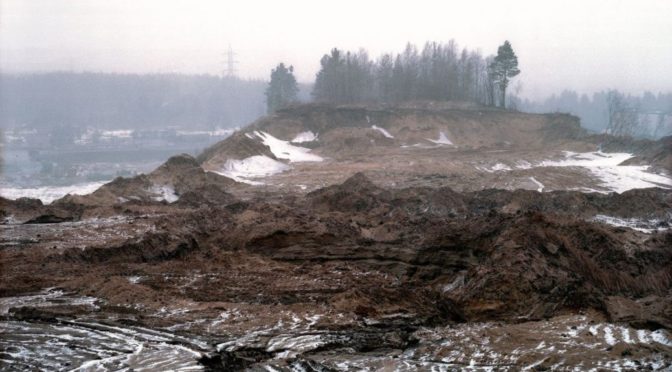
The sixth session of the seminar “Nature(s) & Norms” (NANO), carried out within the framework of the research program SAMSON (Sciences, Arts, Medicine and Social Norms), developed by Sorbonne University (Paris), the Faculty of Arts of the Charles University (Prague), Warsaw University and CEFRES welcomes two participants: Irina Tcherneva (CNRS) and Olga Kaczmarek (Warsaw University).
Location: Paris, CEFRES Library and online (zoom)
To receive the link, please contact us at cefres[@]cefres.cz
Date: Friday, March 24th 2023, 4.30 pm
Language: English
Part 1
Landscape in the comprehension of crimes: practices of Soviet film makers
Irina Tcherneva, CNRS, Eur’ORBEM
Abstract: This contribution focuses on landscape and the spatial dimension in the documentary films and photographs created by the Soviets in 1941-1945 during the liberation of Nazi-occupied territories. The places where Nazi crimes and war crimes took place make the Soviet terrain unique in the history of the Holocaust. Until now, visual analysis has not been mobilized to examine these traces in rural and urban environments. Continue reading Landscapes & Memory in Holocaust film. NaNo seminar #6 →
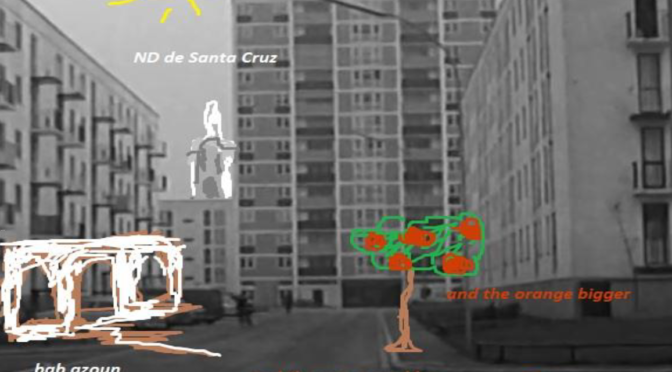
“We never talked about you, but you were always there, Algeria.” Exiles and exiled memories of vanished worlds
6th session of CEFRES in-house seminar 2022-2023.
Through the presentation of works in progress, CEFRES’s Seminar aims at raising and discussing issues about methods, approaches or concepts, in a multidisciplinary spirit, allowing everyone to confront her or his own perspectives with the research presented.
Location: CEFRES Library and online
Date: 14th of March
Language: English
Contact: cefres[@]cefres.cz
Michèle Baussant (CNRS, CEFRES/ Institut Convergences Migrations)
Discussant: Emina Zoletić (CEFRES / University of Warsaw)
Continue reading Exiles and exiled memories of vanished worlds →






